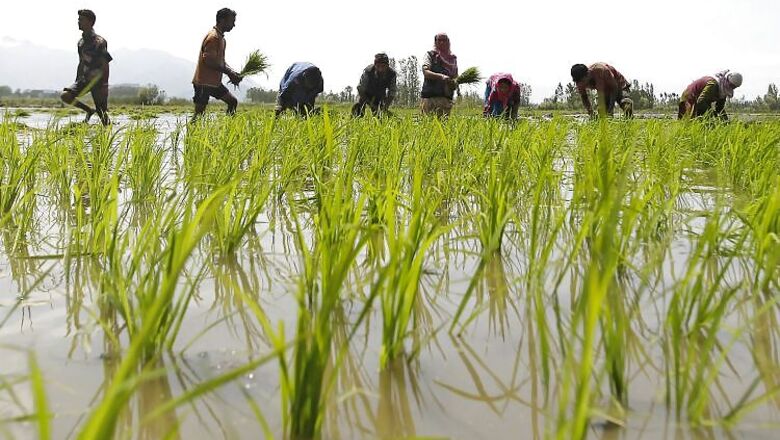
views
This farmer on the Tamil Nadu side of the border with Kerala grows vegetables. He specialises in gourds of various kinds. The creepers are trained on trellises, which cost two and a half lakh an acre, unlike make-shift frames in the past. Much of his land is leased for 15,000 rupees an acre annually. He makes the investment assured that his producers company has taken care of the pricing aspect.
Volumes are critical for the effectiveness of the Kovai company and its 520 members produce about fifty tonnes of vegetables a day. That is about five truck loads in a city that itself consumes, and exports to Kerala about forty times as much. But it is big enough for traders to queue up to their farms and agree to their prices which are set every fortnight. Traders buy weight and not by the sack loads as they would earlier. Prices are close to what consumers pay.
S Mohan Raj, Chairman, Kovai Farmers Producer Co, village Vettaikaranpudur, Coimbatore, said, “Actually, the trader must also survive. So we give legroom for him Rs 1 to 1.5 per kg and if he earns more then next time we will get it back we will pluck it from him.”
A company shop gives farmers the benefit of bulk purchases and the assurance of quality. An agronomist hired as CEO sends regular advisories about plant protection and nutrition. The farmers have adopted scientific practices like mulching with plastic sheets, drip irrigation, calibrated application of nutrients, judicious use of sprays and preservation of soil health with organic manure. The next step is to adopt standards that will enable premium pricing in export markets, and even do their own branding.
Cooperatives have by and large lost public trust because they have become a device for political patronage, though there are star examples like Amul and Vasudhara Dairy. This is making the establishment of farmer producer companies difficult. External agencies that enjoy credibility with local communities can help in providing the initial thrust. The ideal initiators would be those that can take everybody along without any agenda of their own except the greater common good and the empathy and expertise to match.
A spiritual leader whom the people of Thondamuttur near Coimbatore respect provided the initial thrust for a producer company of coconut growers in 2012. Though aware of the gains of collective action, the growers were wary of grand intentions and poor outcomes. It took scores of meetings and little examples to win them over. Trust, once gained, builds on itself and now there are close to a thousand shareholders who have bought shares worth between 2,500 and ten thousand rupees. That is a four-fold increase in number.
OKR Radhakrishnan, Coordinator, Velliangiri Farmers’ Producer Co, Coimbatore, said, “Initially we met the farmers and wanted to aggregate the farmers and register them under an FPO, since the cooperatives are not performing well, the farmers were very much reluctant. Then with the help of volunteers from Isha we mobilized the farmers and we conducted more than 80 meeting. Generally the meetings, were conducted only in the evening. We great difficult we registered 220 farmers initially. Mostly, they are all coconut growing farmers.”
Individually, the small holders were made to feel they counted for little in multiple ways. Coconut pluckers would charge more than a rupee per nut or about eighty rupees per tree. The shellers were equally demanding as agricultural labour is in short supply in this part of the country. Traders would organize both activities, but claim more than their fair share. The farmers company has stopped these exactions. It has engaged teams of pluckers and shellers. They get regular work and charge lower rates. Traders cannot beat down prices; they can buy only at set rates.
K Karthikeyan, Member, Velliangiri Farmers’ Producer Co., village Iruttupalayam, Coimbatore, said, “I had 28,000 coconuts, I sold 14,000 to the local merchant for Rs 2,11,300 and an equal number to the producers’ company for Rs 2,30,600 or Rs 19,300 more. The trader also charged me a shelling fee of Re 1 per nut.”
P Shanmugan, Director, Velliangiri FPC & Farmer, village Vvalaiyan Kuttai, Coimbatore, said, “We have identified the buyers. We get the money immediately. Earlier, it would take 15 to 20 days.”
Farmers claim higher yields from adoption of good farming practices. After a visit to the coconut research institute in Kerala’s Kasargod district they have learnt there is more money in intercrops between coconut palms like turmeric, arecanut and cocoa. There is much talk of organic farming. Some farmers collect biodegradable village waste and enrich it with enzymes. Banding together has brought financial gains and psychic rewards.
K Kanakraj said, “Though I own 2.5 acres, I feel as if I own 25 acres because I have little difficulty in getting coconut plucking, shelling and marketing. There is no tension. I feel like a big farmer.”
The Small Farmer Agribusiness Consortium in Delhi is the fulcrum for farmer producer companies. It was mooted by Manmohan Singh as finance minister in his 1992-93 budget speech which opened up the economy. But the enabling legislation happened a decade later.
There are 445 of them now, Tamil Nadu leads with 51, followed by Madhya Pradesh at 48.Telangana has 44. While producer companies are good at production, finance and marketing will be a challenge. Pravesh Sharma who has been aggressively pushing them admits that scaling up is an issue like with all start-ups but believes state level federated producer companies are the solution.
Pravesh Sharma, MD, Small Farmer Agri-business Consortium, said, “The state level producer company takes care of these higher requirements - arranging finance, talking to input suppliers, talking to buyers. The constituent companies focus on production. The state level producer company can say look let us focus on these three big value chains, let's distribute the production according to the core competence or the agroclimatic conditions where the FPO is situated. This is the way forward and we are seeing some very encouraging results in the first set of SLPCs that have come up in the past one year and some have business plans of over 100 crore for the coming year.”
SFAC has empanelled facilitators like E Vadivel, a former professor of horticulture at Tamil Nadu Agriculture University and known for his decade long outreach to fruit and vegetable growers in the state. He is helping set up nine producer companies, some of which are thriving. The government is as keen if not more. It provides matching equity grants. Eligible ones get credit guarantee. Nabard, a lending agency, wants 2,000 producer companies by end of March next year. Will targets and deadlines help or hinder?
E Vadivel said, “By and large we can expect 20-25 percent of the producer companies which we are going to create will emerge as leaders as is the case with any mission mode activity. In course of time another 40 percent will join, So we can hope for 50 percent of producer companies to fare well.”
Pravesh Sharma said, “I welcome any institution whether public, private, farmer owned which is contributing to the growth and number because unless we have a sizeable critical mass will not be able to impact the market.”
Optimism is natural possible when one sees 86 year old farmer by Bhaskar obtain a bachelor degree in farm technology from Tamil Nadu Agricultural University after a four year week-end course. He is willing to adapt and has taken to growing guavas even at this ripe age.
A fellow shareholder has made a mindset change. Instead of selling what he produces, he grows organic guavas heeding consumer preference. No branding but sheer goodwill fetches him a premium price in the Chennai market.
A former school teacher with a string of post-graduate degrees does ultra high density planting. He packs about 1,000 trees per acre and claims to earn 21 lakh rupees from six acres.
About 35 farmers in Erode have shifted to pomegranate from traditional turmeric, whose prices have yo-yoed from 17,500 rupees per hundred kgs to 6,000 now and 3,500 in between. While selling to traders at fixed prices, they are reaching out to consumers directly with a brand called Erode Farm Fresh.
Cracking the market is a challenge but there are niggling routine ones a well. Complying with the statutory requirements of the companies act can be quite daunting.
Farmers will have to be vigilant in maintaining the autonomy of their companies. Outside control can creep in through government support in the guise of ensuring transparency despite safeguards to prevent them from going the way of cooperatives.
Pravesh Sharma said, “There is no way that the governemnt by giving interset subvention or equity grants can control these bodies because unless you change the companies act whichi is not easy because Parliament has been vigilant in protection Chapter 9A where the producer co legislation is situated. Of course the producer companies will have to prove themselves by acquiring scale as you said earlier, buy showing they can do busienss and more important, showing that small farmers can benefit by entering the value chain through these institutions.”
This is where mobile communications technology and ecommerce platforms can help. Krishidoot, a SMS based service of SFAC and Reuters Market Light connects 380 farmers companies to large buyers and input supplies. It also provides crop specific agronomic services. It is the way to go.
To know more, watch 'Smart Agriculture' presented by Monsanto, every Saturday & Sunday at 4:30 PM and Monday at 5:30 PM on CNN-IBN and every Saturday & Sunday at 4:30 PM on CNBC-Awaaz.




















Comments
0 comment